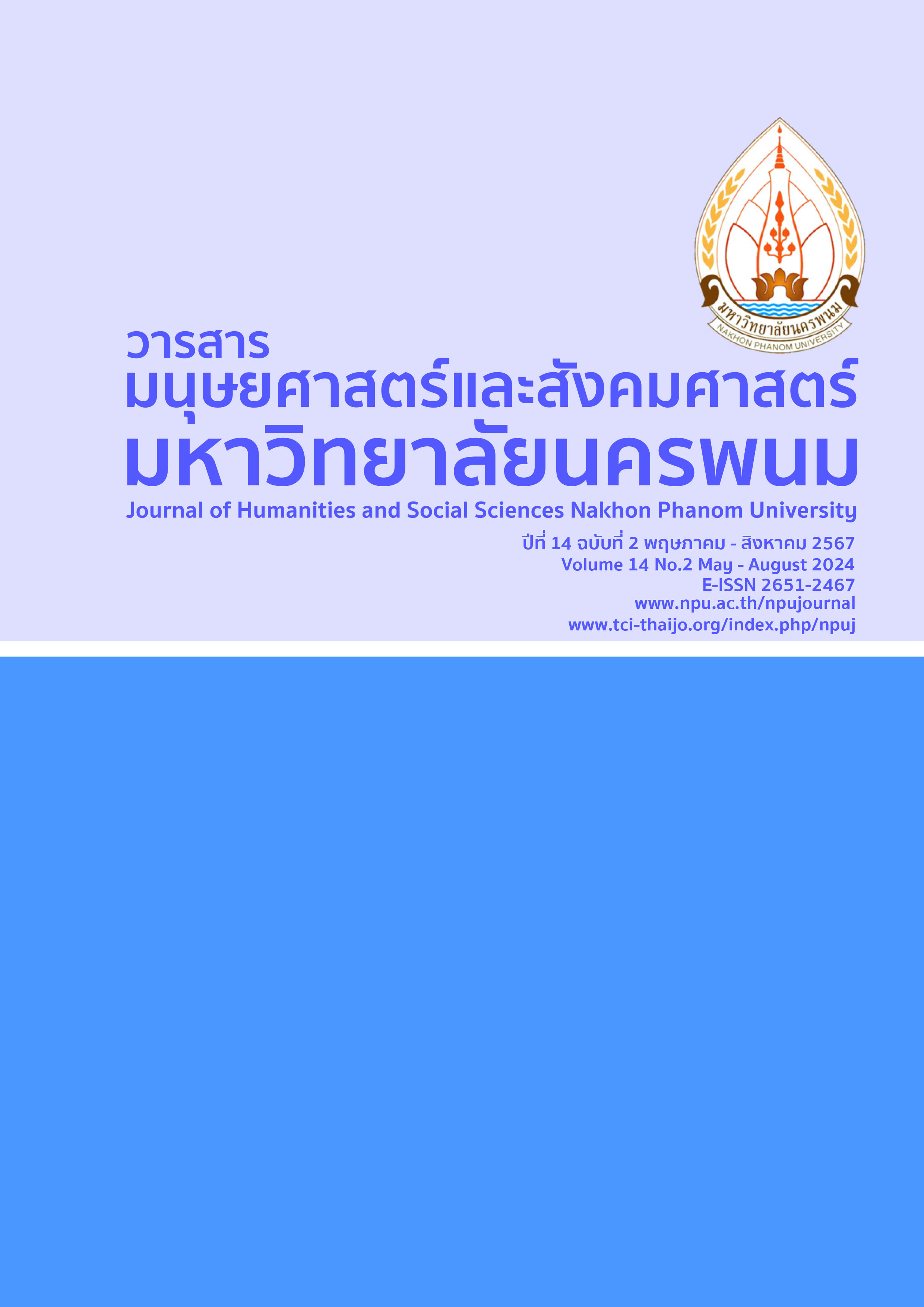Development of Digital Media Technology AR and VR in Three Languages (Thai-English-Chinese) to Promote Sustainable Ecotourism (Nakhon Sawan Bird Park) in Bueng Boraphet Wetlands Nakhon Sawan Province
Main Article Content
Abstract
This research aims to create AR and VR digital technology media in three languages (Thai-English-Chinese) to learn language and culture and promote sustainable ecotourism , to study the quality of AR and VR digital technology in three languages (Thai-English-Chinese), and to survey the satisfaction of citizens and general tourists towards the use of AR and VR digital technology in three languages (Thai-English-Chinese) to promote sustainable ecotourism in the Bueng Boraphet wetland area (Nakhon Sawan Bird Park). The population consisted of 500 people of general citizens and tourists were interested in traveling to the Bird Park were 500 people, and the sample of 80 people who were obtained by accidental and purposive sampling methods. The instruments were used in the research, including: 1) a questionnaire; 2) an interview form regarding the needs of media use; 3) a questionnaire on satisfaction towards the quality of the media, and 4) a questionnaire on satisfaction towards the overall use of AR and VR digital media technology in three languages (Thai-English-Chinese) in promoting sustainable ecotourism (Nakhon Sawan Bird Park). Data were analyzed by using descriptive statistics, mean () and standard deviation (S.D.) using the SPSS program. The results found that 1) the created AR and VR digital technology media in three languages (Thai-English-Chinese) were effective in publicizing and promoting the tourist attractions of Nakhon Sawan Bird Park at a high level ( = 3.80, S.D. = 0.80), 2) the quality of the media created was at a high level ( = 4.80, S.D. = 0.40), and 3) general citizens and tourists were satisfied by the media created at the highest level ( = 4.92, S.D. = 0.6).
Article Details

This work is licensed under a Creative Commons Attribution-NonCommercial-NoDerivatives 4.0 International License.
References
Amazing Thailand. (2023). Nakhon Sawan. Retrieved June 2022, from https://thai.tourismthailand.org/ Destinations/Provinces
Anyflip. (2024). Digital Media. Retrieved December 2022, from https://anyflip.com/vltyf/uflt/basic
Boonsomtob, S., Chokchaisiri, J. & Kumkrua, M. (2020). Mobile Applications Development with the Use of Beacon Technology to Support Historical Tourism Information in Kanchanaburi. Journal of Industrial Education. 19(1),35-46.
BSRU Identity. (2024). Community Based Tourism Management for Sustainable Tourism Development. Retrieved April 2024 from. https://identity.bsru.ac.th/archives/3735
Chitheerasuwet, P., Rodvinij, W. & Poommalee, W. (2021). The Study of Problems and Guidelines for Developing Chinese Communicative Competence for Health Tourism and Cultural Tourism in Province. Journal of Graduate Studies and Social Sciences, Uttaradit Rajabhat Universit, 11(2),65-78.
Chindaduangratn, T., Jamjumrus, T., Changpian, C. & Chindapradist, T. (2023). Sustainable development guidelines for eco-friendly tourism within the boundaries of Khao Yai National Park in the new normal era. SSRU Journal of Public Administration, 6(3),671-685.
Chochaiyatich, R., Saenwa, S. & Seewungkum, D. (2021). The Development of Learning Media by Using Augmented Reality Technology on Library Services Introduction of the Central Library of Srinakharinwirot University. Journal of Library and Information Science Srinakharinwirot University, 14(2),1-16.
Chuamaungphan. O., Kittimalai. J., Boonlop. R. & Ausaha, E. (2021). Adding the Value of Commercial Strategy Knowledge by AR System to Promote the Concept of Urban Development Towards Smart City. Journal of Legal Entity Management and Local Innovation, 7(5),61-74.
Creative Thailand. (2022). Innovation. Retrieved June 2024, from https://www.creativethailand.org/article-read?article_id=33740.
Depa. (2023). Smart City. Retrieved September 2022, from https://www.depa.or.th/th/smart-city-plan/ existing-smart-city
Joobanjong, W., Sanchana, W., Mulom, R. & Suesatsakulchai, A. (2021). Tourism Promotion in Tak Province using Virtual Reality Technology. Journal of Information Science and Technology, 11(1),56-64.
Kantamalajaroen, A. (2021). Development of Tourism Potential for Tourism 4.0 Case Study of Kuedchang Subdistrict, Mae Taeng, Chiang Mai. Retrieved September 2022, from http://mdc.library.mju.ac.th/ thesis/2564/artchariyaporn_kantamalajaroen/fulltext.pdf
Khattiyasiri, P. T. (2020). The Conservation Tourism Management of Mueang Kai Sub-District, Mae Taeng District, Chiang Mai Province. Retrieved November 2022, from https://e-thesis.mcu.ac.th/storage/ TKjDX6zZsVVsAEJfPRlhlE7jxG9OyglE30n5vNPy.pdf
Kuna, P., Alena, H. & Borza, L. (2023). Creation of Virtual Reality for Education Purposes. Sustainability, 15(9),1-19. https://doi.org/10.3390/su15097153
Limpinan. P. (2019). Promoting Mahasarakham Tourism by using Augmented Reality. Journal of Technology Management Rajabhat Maha Sarakham University, 6(1),8-16.
Meesathit, S. & Thopason, P. (2020). A Development of the Virtual Reality Learning Media for Promoting Local Wisdom: “SakonNakhon Indigo Dyed Fabric” a Case Study. Journal of Applied Information Technology. 6(2)31-39.
Montreesree, S. (2019). A Development of Augmented Reality on Animation Creation For Grade 11 Students. Retrieved December 2022, from https://opacimages.lib.kmitl.ac.th/medias/pdf/09022037.pdf.
Noamna, S., Thongphun, K. & Yodmongkol, P. (2020). Application Virtual World for Cultural Tourism. Journal of Information Science and Technology, 10(2),71-76.
Nakhonsawn One Minute. (2023). Nakhon Sawan Statistical Office Present. Retrieved July 2024, from https:// nksawan.nso.go.th/index.php?option=com_content&view=article&id=117:nakhonsawan-one-minute& catid=38.
Noynalum, T. (2021). Local regulation model on the management of bueng boraphet wetland of nakornsawan province. Retrieved December 2022, from http://dspace.spu.ac.th/handle/1234567 89/7436
Numpradit, J. & Chaichomchuen, S. (2019). Elements and Steps for Developing an Educational Virtual Reality System. Journal of Education Khon Kaen University, 42(2),1-18.
Phet-Thai, S. (2022). Augmented Reality in Tourism. Retrieved December 2022, from https://research.kpru.ac. th/sac/fileconference/28422018-05-03.pdf
Ramkhamhaeng University. (2024). W.G. Cochran. Retrieved December 2022, from http://www.edu.ru.ac.th/ images/edu_files/formulation_example.pdf
Sawasdee, H. (2020). The Community-Based Tourism Development Guidelines for Suatainnable Tourism Mansgement at Ban Tharae, Muang District, Khon Khaen Province. Journal of Sustainable Tourism Development, 2(1),64-73.
Sifa, K. (2019). New Aesthetics in the Virtual Reality World. Siam Communication Review, 18(2),48-56.
Soontorntanaphol, N. & Prasantri, W. (2021). The Transition of On-site Practical Music Teaching to Online Teaching as a Result of the COVID-19 Crisis. HUSO Journal of Humanities and Social Sciences Phranakhon Rajabhat University, 5(2),160-179.
Tratsaranawathin, P. & Jariyapoom, T. (2021). Development of augmented reality and virtual reality for geo informatics presentations of Information Science of King Mongkut’s University of Technology North Bangkok Rayong Campus. Sarakham Journal. 12(2)184-210.
Wikipedia. (2019). Ecotourism. Retrieved December 2022, from https://th.wikipedia.org/wiki/
Wongrekdee, C., Petchboonmee, P. & Narknarin, T. (2023). The Promoting of Culture Tourism on Tourism Route from Amphoe Mueang to Mae Sot, Tak Province by Augmented Reality Technology. Journal of Science and Technology RMUTSB, 4(1),1-10.


